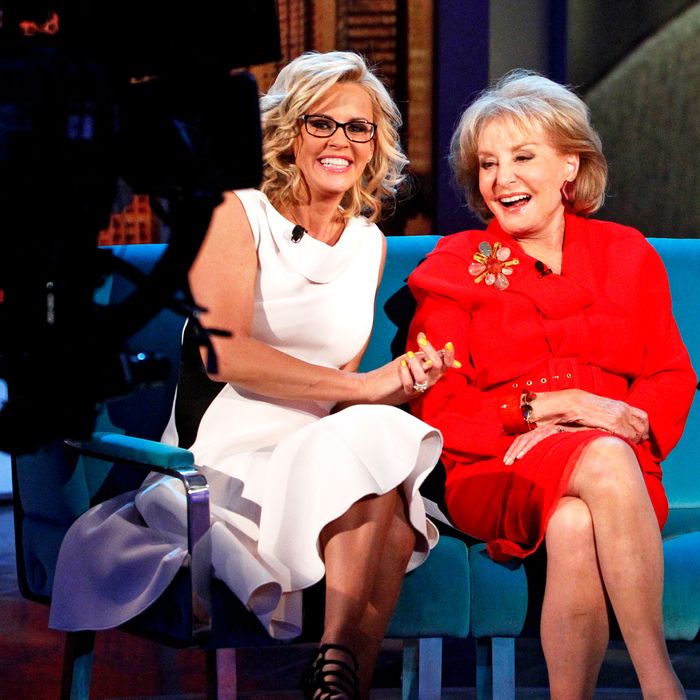
As the 11th co-host on The View, Jenny McCarthy found herself in a horror movie. She took the job expecting to bring some humor to Hot Topics, but that wasn’t possible given the atmosphere on the set. Barbara Walters was in despair that she was retiring, and she made it clear that she didn’t want to go quietly. Whoopi Goldberg had no patience for Barbara’s clinging to whatever power she had left. And ABC bosses soon realized that they had accidentally dumped what had made The View successful — the panel’s fire and ice.
Jenny, who had been a guest on The View in the past, had already survived a traumatic encounter backstage. “You know the movie Mommie Dearest?” Jenny asked me one afternoon over lunch. “I remember as a child watching that movie and going, ‘Holy cow!’” She paused for effect. “I’ve never seen a woman yell like that before until I worked with Barbara Walters.”
In 2007, Jenny was promoting her book Louder Than Words: A Mother’s Journey in Healing Autism, in which she argued that vaccines weakened her son’s immune system and triggered his autism. She claimed that she had improved Evan’s health through a gluten-free diet of cod-liver oil and vitamins along with behavioral therapy. Even though this treatment wasn’t supported by any medical research, her fame as a former Playboy model, MTV host, and actress provided her with a big megaphone. “I was on Oprah,” Jenny recalled. “Everyone was coming out of the woodwork. I was mainly getting, ‘Thank you for speaking up.’”
Her publicity tour took her all the way to The View. Before the interview, a producer told Jenny that Barbara wanted to speak to her.
“I walked into her dressing room and she blew up at me,” Jenny said. “She was screaming, ‘How dare you say this! That autism can be cured?’ My knees were shaking. I remember my whole body was shaking.”
Jenny responded that she never used the word cured to describe Evan’s condition. That didn’t matter. “You’re such a liar!” Barbara screamed.
“This lasted for about seven minutes,” Jenny said. “Finally, someone pulled me out of the room. I went back to my dressing room, not knowing what the fuck to do. One of my heroes just chewed me a new asshole, and I’m going on live TV. I’m freaking the fuck out.” The producer told her that Barbara didn’t want Jenny to walk onto the set as a guest because that would prompt the audience to clap. Instead, the interview began with Jenny on the couch, wedged between the ladies, with the camera on Barbara for an introduction.
“As they pull out from her face, I’m sitting there, terrified.” Jenny wasn’t worried about what she had to say; she thought Barbara wouldn’t let her speak. “It was not like I was trying to prove a scientific fact. It’s my story. I knew she couldn’t outsmart me in this interview because she can’t tell me what happened with my child. I was able to calm myself down.”
The conversation played out more peacefully than it had in the dressing room. Barbara challenged Jenny — as any journalist would — about the idea that autism could be cured. Only later did Jenny wonder if Barbara had lost her temper because of her sister, Jackie, who had died in 1985. Barbara often said that she thought Jackie might have been autistic. “Back then, there really wasn’t anything you could do about it,” Jenny said. “She didn’t want to hear that there was maybe a possibility that her sister could have gotten better.”
When Jenny finished the interview, she made a promise to herself. “I said, ‘I’m never going on the fucking View again. Ever. Cut to a few years later, I have more books to sell.”
On her next appearance — in 2012 — Barbara couldn’t have been more welcoming to Jenny, who was promoting a memoir titled Bad Habits: Confessions of a Recovering Catholic. “She fully read my book cover to cover,” Jenny said. “She came to my dressing room and quoted dirty stories from it, asked me to autograph it for her, and she had no recollection that I had been there before. She was hugging me, loving on me. I was like, ‘This is the craziest fucking shit I’ve ever experienced in my life.’”
Jenny saw an opening for herself. After two decades as a goofball on TV — she’d channeled a bawdier Vanna White on the 1995 MTV dating series Singled Out — Jenny wanted to graduate to more substance. “I remember thinking to myself, I want to do something that has a little more class to it. And spread my wings a little bit.” In 2013, she hosted a cable talk show on Friday nights, where C-list stars guzzled down Martinis. “My VH1 show was a little too raunchy. I wanted something in the middle.”
Then she heard about Joy Behar’s departure. “I thought to myself, That’s where I’m going next.” Bill Geddie invited her to audition for season 17. “I went on and it went great, and I went on again. They said, ‘You’re in the top consideration to be a co-host.’”
As she waited for an offer, she pursued an opportunity with CBS for her own daytime show. It would be filmed in Chicago, where she lived with Evan, but Jenny didn’t want to become another celebrity with a flop in the afternoon. She believed, perhaps naïvely, that there would be more job security on The View. “I would rather be on a show that’s established,” she told herself.
That summer, in 2013, CBS tried to get her to sign with them. Jenny called Geddie on the July 4 weekend to let him know that she was about to accept the deal.
“Shit,” he said. “Give me an hour.”
Geddie had been trying to find the perfect co-host to replace Joy and Elisabeth Hasselbeck, to bring more pop-culture expertise to The View. Since the network wanted the show to steer clear of politics, the new hire would need to be fluent in celebrity gossip and reality TV, such as The Bachelor and Dancing With the Stars. That was the winning formula on The Talk, which still trailed The View in the ratings. Geddie had tested Brooke Shields for the new seat, but market research revealed that viewers found her too stiff. “I liked her,” Geddie said. “For some reason, our audience never warmed to her.” Another option: the comedian Ali Wentworth, from In Living Color, who was married to GMA co-anchor George Stephanopoulos.
Since Barbara didn’t feel strongly about any of the options, she let Geddie choose his favorite. “I always thought early on, if we could have gotten Jenny McCarthy, we would have,” he told me. “She was too big of a name then.” He made the case to ABC, and they drafted a contract. “I thought that for the show they wanted to do, she was a good choice.”
One red flag that no one seemed to worry about was Jenny’s views about autism. It hadn’t come up as a problem in any of the trial shows, and Geddie didn’t think it would define her on The View. He’d told her they wanted her to riff on movie stars. “How Bill sold it to me is that they actually let go of Joy and Elisabeth because they wanted to get rid of politics,” Jenny said. “It was polarizing. That’s the word he kept using: It was very polarizing to the audience.”
He told her, “We want pop culture, irreverent, fun, sassy.”
“I checked all those boxes for him.”
On July 15, Barbara cheerfully introduced Jenny as the latest co-host on The View, an announcement that was met with an avalanche of negative press. Many critics thought that by hiring Jenny the show was giving her a platform to spread wrong information to parents about not vaccinating their children. Media outlets that didn’t normally cover daytime TV, such as the Columbia Journalism Review and The Nation, voiced their disapproval.
Time’s TV critic, James Poniewozik, wrote a post with the headline “Why ABC Shouldn’t Have Hired Jenny McCarthy.” He expressed concerns about Jenny’s becoming the new Elisabeth, with quackery instead of political controversy. “Discussing the news, even at 11 in the morning, comes with responsibility,” he wrote. “And for a show even remotely about news — and a career newswoman like Walters — to legitimize McCarthy’s dangerous anti-science because she will probably get crazy attention and ratings is irresponsible and shameful.”
Jenny believed that the hostility toward her originated from a lobbying group that wanted to silence her. “I had to deal with a hurricane, a tornado. I consider myself to be pro-vaccine, but pro–safe vaccine. There’s another group, they go out and try to get me fired from every job I’ve ever done. They are invisible but powerful.”
Geddie tried to assure her that it didn’t matter, that there was no such thing as bad publicity. Jenny wasn’t so sure: “I knew way up on the totem pole, it would bother somebody, because Big Pharma is pretty powerful. If they told ABC they were going to pull some of their advertising, I could very well lose my job. I was a nervous wreck. I just let go of my own talk show in Chicago. I had signed a one-year contract with The View. Now I’m dealing with all this bad publicity and I have to feed my baby.”
When Jenny started at The View, she wondered which version of Barbara she’d see every day at the studio. “Hopefully, I get the Barbara Walters who is nice,” she told herself. The timing of her arrival made that unlikely. For Barbara, Jenny represented that the end was near. At 83, Barbara still had plenty of energy, but she found herself facing a mixture of complicated emotions, from aggravation to fear about being forgotten. Her memory was cloudy, and she’d been known to make odd outbursts in private conversations. “Imagine a woman like Barbara Walters,” Jenny explained. “It’s her last year and she doesn’t want to leave. Think about that. And I’m the new bitch there.”
One day in Hot Topics, Jenny sounded off about Katy Perry dating the bad-boy musician John Mayer. “I saw Barbara’s face with her big saucer eyes look at me,” Jenny said. “Then we went to a commercial. She said, ‘Who is it that you’re talking about and why are you bringing her up?’”
“I’m, like, ‘That’s Katy Perry. You interviewed her last week!’”
Jenny recalled, “That wasn’t the right thing to say. I felt everyone kicking me under the table.” The other co-hosts had devised a method to send signals to one another about how to deal with Barbara. “You either had the knee hold or the kick under the table.”
During another show, Jenny referred to herself in the third person, telling a story about meeting a fan. “Who is Jenny McCarthy?” Barbara asked on TV.
Jenny played it off as a joke. “I totally brushed it off. That’s where Barbara’s head was. She was spacing out. She was checking out.”
Within days, The View had new instructions for Jenny. “I was told, ‘We cannot do pop culture anymore because she doesn’t know who the people are.’” The View instructed Jenny to tackle politics. “I panicked because I don’t consider myself a political person. My controversy is in vaccines. I know I’m not talking about that every day. Now I had to figure out, ‘Am I coming out as a Republican or a Democrat? Where do I stand on all the social issues and political issues?’”
At the start of the season, Jenny had visited Whoopi’s house, thinking they could maybe be friends. “I loved her in Ghost,” Jenny said. “I’m a fan. I thought I was going to work with the Whoopi that people thought they might know — fun and funny.” But Whoopi didn’t warm to Jenny. “The table is an interesting dynamic because it reminds me a little bit of Survivor. There were allies, and there weren’t many people to choose from. Do I side with Barbara, who is royalty, but she’s leaving? Or do I take Whoopi, who is a force to be reckoned with?” Jenny aligned with Sherri Shepherd, knowing that they had similar personalities as moms with young boys. Jenny didn’t want to build a friendship out of a power grab.
That left Barbara and Whoopi to face off, each with a grip on her own corner of The View. “There was a war between Barbara and Whoopi about Barbara wanting to moderate,” Jenny said. “This is one of the reasons I decided not to ally with Whoopi. It broke my heart when Barbara would shuffle to Whoopi and say, ‘Can I moderate, please?’ And Whoopi would say no. How can you do this to a woman who paved the way for so many female journalists? The reason we’re doing this job is because of Barbara Walters.”
Barbara’s fixation on the moderator’s chair turned into an unhealthy obsession. In conversations with the staff, Barbara loved to complain about all the different ways Whoopi had botched an introduction or mixed up facts. Whoopi resented that Barbara was trying to run her over. “Whoopi was very angry,” said Jenny. “She was angry that she wasn’t being paid what she was worth, rightfully so.” Whoopi had always tried to be a team player, but she felt that ABC wasn’t treating her like a valued employee. One idea she had, to do a live version of Sister Act as a prime-time musical (like NBC’s Sound of Music Live!, starring Carrie Underwood), was turned down by Paul Lee, the president of ABC Entertainment Group. The network hadn’t even offered Whoopi a raise for keeping The View afloat.
As the friction grew, Whoopi frequently cut off her co-hosts during Hot Topics to remind everyone who was in charge. “People don’t understand,” Jenny said. “Whoopi can knock over anyone in a debate. Her voice is strong not only in meaning but also in sound. I was able to get a point out in three words — like ‘I don’t agree’ — and that’s all I would be able to say. I would be stepped on or interrupted.” Jenny thought that Whoopi didn’t like that Jenny hadn’t deferred to her enough. “I wasn’t going to play a kiss-ass. To me, Whoopi had an addiction to controlling people’s thoughts, their words, the room, the table, your feeling, your mood. She had an addiction to controlling all of it and everybody.”
The co-hosts on The View always had a relaxed dress code, but Jenny felt that her wardrobe was under constant scrutiny. When she wore glasses on the show, viewers attacked her on Twitter for trying to look smart. “Really?” she thought. “I just couldn’t fucking see. The teleprompter was so far.”
In the past, Barbara hadn’t paid much attention to the other co-hosts’ wardrobes, but this became a new tic for her. “We would all show up in the makeup room,” Jenny said. “Barbara would check out what I was wearing. If she didn’t agree with it, or it didn’t complement her outfit, I had to change.” Jenny estimated that over the next seven months she switched 50 outfits as a result of Barbara’s withering gaze, as if they were doing a photo shoot at Vogue instead of a daytime talk show.
Barbara would object to Jenny’s choosing a summer dress on a cold day. “What the hell are you wearing?” Barbara asked her about a sleeveless outfit by designer Victoria Beckham.
“Mind you, she doesn’t look at anyone’s clothes but mine,” Jenny said. “I’d go, ‘Barbara, you’re wearing your own clothes.’” Jenny’s outfits were pulled by a stylist. She’d try to remind Barbara, “Stores right now have the spring collection. There’s nothing I can do.’”
“Change!” Barbara would demand.
“I always had to go put on a sweater.” And then there was this: “She wanted to start dressing like me. There were times when she’d say change, and she’d make people run out and get that dress in her size. I was a human Barbie doll.”
To protect herself, Jenny tried to avoid Barbara. “When I’d hear the shuffle of her feet, I knew that Barbara was after me. It would get faster. Oh my God — she’s coming! Based on the speed of the shuffle, I would hide or get on the phone.”
One morning that autumn, Jenny answered the door to her dressing room. Barbara was very upset about something she’d seen in the communal bathroom. She wasn’t trying to be mean to Jenny. But she needed to express her disapproval — and she’d lost her bearings.
“Jenny, there’s a tampon floating in the toilet and it’s disgusting.”
“I don’t have my period. It’s not mine.”
“Do something about it!”
“I don’t know what to do,” Jenny said, flabbergasted. “She’s standing in the hallway where the guests are, yelling at me about a tampon. I don’t know. Maybe in her brain, she went, ‘I’m going to the youngest, newest person here, because obviously she has her period and left a tampon floating.’ This is Barbara Walters. I’m not going to yell at her. So finally I said, ‘I’ll take care of it. I’ll take one for the team and I’ll flush it.’”
As The View went back to a disaster zone, the network rang the alarm bells. At least under Rosie, the show was a ratings phenomenon. With Jenny at the table, people were turning it off. “We didn’t bring the numbers up that year,” Geddie said. “They blamed everyone but themselves. The idea that a show has legacies to maintain, this was lost on them.” Without politics, The View had lost its edge and felt like every other copycat talk show.
Lisa Hackner, the new executive vice-president of ABC Daytime, called a meeting with the co-hosts to tell them that 30 percent of the viewers had left with Elisabeth Hasselbeck. All the jaws in the room dropped. “They felt we needed more conflict,” Sherri told me. “I remember Whoopi making faces and saying, ‘We’re not going to fight at the table.’”
As The View tried to swivel back to politics, Jenny found herself in an awkward situation. “They did try to change me. They wanted Elisabeth back, and I wasn’t Elisabeth. I would literally have meetings before the show of them trying to input opinions in me to go against Whoopi.” Jenny wanted to quit. “I was going to work crying. I couldn’t be myself. My fans were telling me, ‘Where’s Jenny? They aren’t letting you be you.’”
If all this weren’t hard enough, Barbara’s health continued to deteriorate. One day, just as the show ended, she collapsed into the arms of a stage manager. She had to be taken to the greenroom, where they laid her down on a sofa. The staff called the paramedics. But Barbara, concerned that the sight of her on a stretcher would make it into the papers, instructed them to take her to her dressing room. Once inside, she locked the door and wouldn’t let anyone in. “Barbara, are you okay?” they pleaded. She finally came out to be taken to the doctor. The next day, Barbara acted like it was business as usual.
Barbara, who had let her career define every facet of her life, couldn’t fathom a future without the cameras. “She kept saying backstage, ‘I don’t want to go. I don’t want to leave,’” recalled Jenny, who felt bad for her. “Look at what Barbara did to me. I had zero hard feelings. I loved her like a grandma. She didn’t know any better.” But Jenny was less forgiving of her other co-host. “Whoopi knew better.”
That spring, Barbara pleaded with Whoopi one more time to allow her to moderate The View for her final days on TV. Whoopi wouldn’t budge — she wasn’t forfeiting her ground. When Barbara tried to go over her head by complaining to the ABC brass, Whoopi referred them to a clause in her contract that afforded her the show’s sole moderator duties.
“Every day I went home and I was miserable,” Jenny told me. “It really was the most miserable I’ve been on a job in my 25 years of show business. I kicked myself for not taking the CBS job, of course. But I felt there was a little bit of hope. I thought, maybe when Barbara leaves, the ratings will go up, because they kept saying the focus groups hated Barbara and that’s why they were forcing her into retirement.”
The viewers who grew up with Barbara could tell that it was time for her to let go.
Excerpted with permission from the book Ladies Who Punch: The Explosive Inside Story of “The View,” to be published by St. Martin’s Press on April 2.




